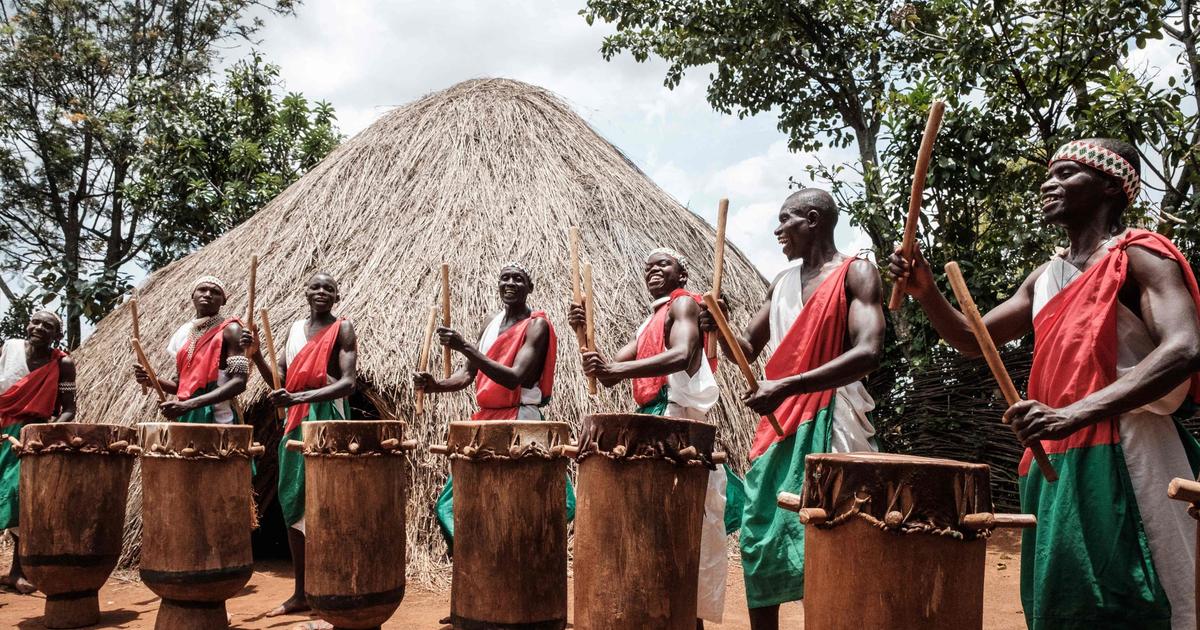Even the air trembles.
With monumental strength and undisguised pleasure, the thirty or so drummers beat their enormous wooden drum with precision, Burundi's “
national jewel
” listed as a UNESCO World Heritage Site but kept under control by the authorities.
Barefoot on the ocher earth, the artists - athletic silhouettes draped in the colors of Burundi - strike the skin then the deaf sides of the instrument, sing, twirl, with the countless hills of this African country of the Great Lakes as a backdrop.
"We beat the drum because it's our vocation, because it's in our blood
," recounts after the performance, his face dripping with sweat, drummer leader Oscar Nshimirimana, 43.
“It was not only my father who beat the drum, but all my great-grandparents
,” adds the leader of the Gishora troupe.
This locality near the political capital Gitega is known throughout the country as a sanctuary of the Burundian drum, whose troupe constitutes an elite.
In January, President Evariste Ndayishimiye caused a stir when he took part in their show.
Read alsoEx-Burundian minister guilty of "human trafficking" sentenced to pay 2 million euros
But this small country of 12 million inhabitants is full of dozens of other troupes, professional or amateur, who train, play at official events, weddings or baptisms and compete against each other.
The immense diaspora is not to be outdone: from Canada to Kenya via Belgium, drummers can be found on at least three continents.
“The ritual dance with the royal drum has remained, until today, the jewel element of the intangible heritage which is the pride of the Barundi”
, praises a document from the Ministry of Culture.
"The prodigious leaps, the pirouettes, the winks addressed to the spectators (...) all this has always marked this dance, as the bearer of an extraordinary tradition in the whole of African percussion and world".
A male tradition
Dating back to the 17th century, the tradition of the drum (“
ingoma
” in Kirundi) symbolized in monarchical Burundi the sacred and timeless character of royalty.
When a king came to power, he was said to ascend the ingoma.
In Burundi, the most precious drums have a name.
And if several have disappeared, two of them - Ruciteme and Murimirwa - are religiously preserved in Gishora, enthroned in the middle of a traditional straw hut.
For a long time, they could only be cut from gigantic trunks of umuvugaangoma,
“the tree that makes the drum speak”
, after a ritual ceremony.
Recognizing the strength of this tradition, Unesco listed the Burundian drum as a World Heritage Site in 2014. Shortly after, in 2017, the Burundian power, an authoritarian regime resulting from a former armed rebellion, established strict control of practice.
Certain aspects of the law have ratified old but somewhat forgotten rules, such as the prohibition for women to play.
Others have made the practice more rigid, such as the registration of each troupe with the authorities as well as the issuance, for each private event, of an authorization accompanied by the payment by the client of a tax of 500,000 Burundian francs (235 euros). , a tidy sum in a very poor country.
Read alsoFrom Afghanistan to Zimbabwe, the lost territories of globalization
For Aimable Nkunzumwami, adviser to the office of the Minister of Culture, the government must, all the more since the registration with UNESCO, to
"respect the cultural identity"
of the drum.
"It's the government that (must) protect the Burundian drum, that's why it regulates
," he told AFP.
In February, a troupe of drummers caused a scandal when they played at a festival... in black costumes.
The festival was shut down and the troupe suspended for six months.
“It took away something that was ours”
Professor of political science
In Bujumbura, the amateur troupe of Calixte Irantije, a 27-year-old engineer, trains twice a week after work in an open-air amphitheater.
"These rules have caused the reduction of requests (...) this has had a great impact on the markets that we had before,"
he explains.
“Now we participate in parties that are known to the government.
We play in certain weddings of a few individuals (who have authorization) and official government ceremonies, ”
he continues.
In 2017, many Burundians, especially from the diaspora, denounced on Twitter
"a monarchical drift"
of power.
“The drum no longer belongs to the Burundian citizen, it belongs to the government
,” lamented Pacifique Nininahazwe, one of the leaders of civil society in exile.
For analyst Julien Nimubona, these restrictions do not illustrate an
"authoritarian control strategy"
, but rather an opportunistic desire to profit financially from registration with Unesco.
“It took something away from us, which was ours”
, however admits this professor of political science at the University of Burundi.

